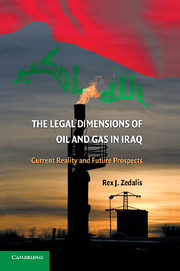Book contents
- Frontmatter
- Contents
- Foreword
- Acknowledgments
- Prologue
- PART ONE THE CONTEXTUAL BACKGROUND
- PART TWO THE COMPLICATIONS ASSOCIATED WITH IRAQI LEGISLATIVE MEASURES
- PART THREE CURRENT ISSUES AND POTENTIAL FUTURE PROBLEMS
- 7 The Matter of Creditor Claims: An Examination of United Nations Security Council Resolutions 1790 (18 Dec. 2007) and 1859 (22 Dec. 2008), and Their Predecessors
- 8 Central Government Authority to Strike Oil and Gas Development Agreements in the Absence of a Federal Framework Law
- 9 Distributing Profits in the Absence of a Federal Revenue-Sharing Law
- 10 Changing the Mix: Transition Fails and the Face of Iraq Is Altered
- Epilogue
- Index
8 - Central Government Authority to Strike Oil and Gas Development Agreements in the Absence of a Federal Framework Law
Published online by Cambridge University Press: 07 December 2009
- Frontmatter
- Contents
- Foreword
- Acknowledgments
- Prologue
- PART ONE THE CONTEXTUAL BACKGROUND
- PART TWO THE COMPLICATIONS ASSOCIATED WITH IRAQI LEGISLATIVE MEASURES
- PART THREE CURRENT ISSUES AND POTENTIAL FUTURE PROBLEMS
- 7 The Matter of Creditor Claims: An Examination of United Nations Security Council Resolutions 1790 (18 Dec. 2007) and 1859 (22 Dec. 2008), and Their Predecessors
- 8 Central Government Authority to Strike Oil and Gas Development Agreements in the Absence of a Federal Framework Law
- 9 Distributing Profits in the Absence of a Federal Revenue-Sharing Law
- 10 Changing the Mix: Transition Fails and the Face of Iraq Is Altered
- Epilogue
- Index
Summary
INTRODUCTION
Before considering the question of whether the federal government is vested, in the absence of the adoption of oil and gas framework legislation, with sufficient authority under the Iraqi Constitution to enter into oil and gas development agreements, one would do well to reflect on the large variety of contractual arrangements that such development agreements might take. In the broadest sense, such arrangements can be categorized on the basis of the form of payment used to compensate foreign partners, or according to the nature and character of the labor to be provided. The Introduction to this chapter, however, blends these together and speaks of the arrangements in more traditional terms common in the international oil and gas industry.
One form of development agreement arrangement could involve a production-sharing contract (PSC). Those have been employed by the Kurdistan Regional Government (KRG) in attempting to enlist overseas support for developing Kurdish oil and gas resource deposits. And, as observed in Chapter 4, they are regulated under both KRG and federal legal provisions. The production-sharing contract involves the international oil and gas company in providing a vast range of activities associated with developing identified oil and gas deposits. In return, the company receives some fractional share of the product actually lifted. The fractional share can be calculated in a number of ways, from a share of the total amount of oil and gas produced, to a share from what remains after adjustments have been made for items such as costs, taxes, fees, and other exactions.
- Type
- Chapter
- Information
- The Legal Dimensions of Oil and Gas in IraqCurrent Reality and Future Prospects, pp. 244 - 270Publisher: Cambridge University PressPrint publication year: 2009

